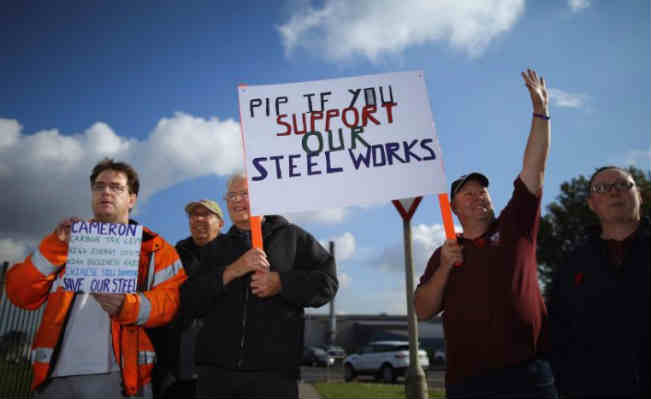 Protesting steel workers in Scunthorpe. Image: Getty
Protesting steel workers in Scunthorpe. Image: Getty
The crisis in the steel industry exposes the disaster that is Tory economics, and why we need to fight for a real alternative, argues John Westmoreland
The announcement by Tata Steel that the rolling mill and coke ovens at the firm’s Scunthorpe works will shut brings job losses in Britain’s steel industry to 5,000. It means that in just a few weeks, one in six of Britain’s steelworkers have now lost their jobs. There may well be more to come as the crisis in the steel industry becomes desperate. In Scotland, steel production could be virtually wiped out, as it already has been on Teesside with the closure of the Redcar works.
As the steel industry spirals into meltdown, Cameron and Osborne, the authors of the ‘Northern Powerhouse’ proposal look on, as irresponsible as they are clueless. When Foreign Secretary, Philip Hammond was asked why the government did not intervene and use the state visit of Xi Jinping to raise the issue of China dumping cheap steel in Europe, his reply betrayed the Tories’ narrow, market-obsessed outlook, devoid of humanity, uncomprehending at the call for government intervention:
“We have got to get the balance right: trying to protect our steel industry in a sensible way, which we are doing, but recognising that we are operating in a global economy. We can’t simply build a wall around the UK.”
What protection the steel industry is getting from the Tories remains a mystery, and actually, nobody has advocated building a trade wall. Hammond’s position flies in the face of the actions of a host of other governments that have intervened to protect their steel industry. Germany, the USA and others have moved to stop cheap steel knocking out a vital part of their economy.
In Scunthorpe, steel is the mainstay of the local economy, and when an industry this dominant goes, the knock-on effects spiral. There are a host of supply industries in engineering and transport that will be hit. As the town closes down and steel workers move away from Scunthorpe, house prices will fall and workers will face the dilemma of negative equity. Then there is the knock-on to the retail sector. Unthinkable? Not if you are a Conservative.
Neoliberalism unravelling
The Tory government may like to claim that it is a government for one nation, but in no sense is this true. Cameron and Osborne are the agents of big-business in Westminster, breaking down obstacles to business in the form of planning regulations, trade union representation and campaigning groups that represent ordinary people on the one hand, and offering tax breaks and capital incentives to business on the other. To pause now and think about the consequences of the steel closures for communities like Scunthorpe would be denying the right of big-business to decide our futures and conceding that trade unions have a legitimate voice in shaping our lives.
The Tories are addicted to austerity. Their feeble pandering to giant corporations is criminally irresponsible. If we lose the backbone of our steel industry it is gone forever. Transporting steel across the globe so that Chinese corporations can grab as much foreign currency as possible, to stave off their own crisis, is insane. The flow of capital in the world market, away from where it is needed to where it gains the most profit, is bound to cause untold damage. We do not want a government that serves the masters of chaos, we want one that protects us from them. What we need is coherent industrial planning to replace the wild gyrations of the market.
Planning our way to a better future
We need a steel industry that works to supply our needs, integrated in an engineering economy that makes what we need, and served by an integrated transport industry. This is the basis for an economy that will work for all of us.
That is why we should be wary of some of the demands of the steel unions that are supported in the Daily Mirror. Their Save our Steel campaign argues for:
- An immediate cut in business rates for the steel industry and a fairer system of valuation.
- Give the steel industry a break from green taxes and high energy bills
- Block China from dumping cheap steel on the UK market
- Buy British. Major infrastructure and construction projects and all government backed contracts should look to use British-made steel
These demands mix some sensible solutions with the very neoliberal assumptions that encourage speculation, greed and further crisis.
When the financial crisis hit in 2008, businesses tracked their capital away from western economies to China. China used that capital to carry world growth forward, which is where that cheap steel is coming from. Criticism of China is therefore a criticism of letting giant corporations dictate to us through the market. We need alternatives to the market, not further contortions.
Building infrastructure is vital, and although ‘Buy British’ is a meaningless concession to the right, we should plan our own economy without having to supply super profits to multinational corporations. This means overturning the Tory retreat on renewable energy generation. Green taxes, far from being watered down, should be providing the capital for that much-needed project.
Cutting business rates is not a solution either. We are in the current mess because we have relied on private investment and handed ownership and control to them. Private ownership increases the vulnerability of our industries. Wholesale nationalisation makes far more sense.
We need to make business accountable to the people, and create an economy for the future. Osbornomics is a disaster, and sadly the worst is yet to come, unless the trade unions fight for a real alternative.

